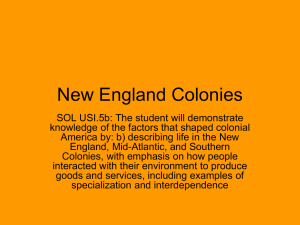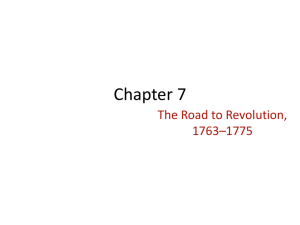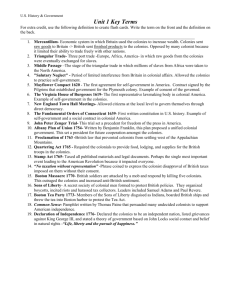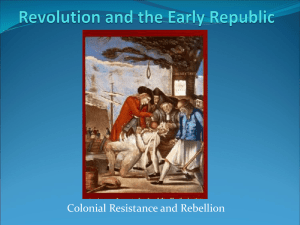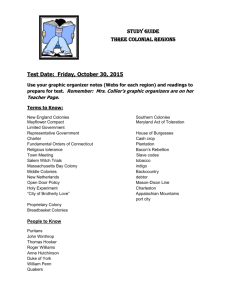Fall 2011 Semester Review answers
advertisement
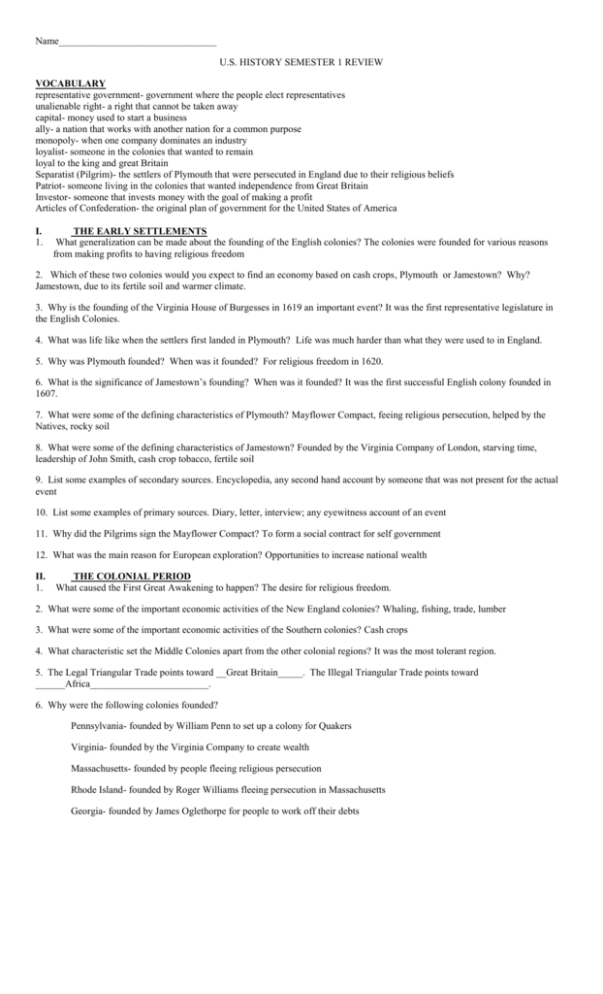
Name________________________________ U.S. HISTORY SEMESTER 1 REVIEW VOCABULARY representative government- government where the people elect representatives unalienable right- a right that cannot be taken away capital- money used to start a business ally- a nation that works with another nation for a common purpose monopoly- when one company dominates an industry loyalist- someone in the colonies that wanted to remain loyal to the king and great Britain Separatist (Pilgrim)- the settlers of Plymouth that were persecuted in England due to their religious beliefs Patriot- someone living in the colonies that wanted independence from Great Britain Investor- someone that invests money with the goal of making a profit Articles of Confederation- the original plan of government for the United States of America I. 1. THE EARLY SETTLEMENTS What generalization can be made about the founding of the English colonies? The colonies were founded for various reasons from making profits to having religious freedom 2. Which of these two colonies would you expect to find an economy based on cash crops, Plymouth or Jamestown? Why? Jamestown, due to its fertile soil and warmer climate. 3. Why is the founding of the Virginia House of Burgesses in 1619 an important event? It was the first representative legislature in the English Colonies. 4. What was life like when the settlers first landed in Plymouth? Life was much harder than what they were used to in England. 5. Why was Plymouth founded? When was it founded? For religious freedom in 1620. 6. What is the significance of Jamestown’s founding? When was it founded? It was the first successful English colony founded in 1607. 7. What were some of the defining characteristics of Plymouth? Mayflower Compact, feeing religious persecution, helped by the Natives, rocky soil 8. What were some of the defining characteristics of Jamestown? Founded by the Virginia Company of London, starving time, leadership of John Smith, cash crop tobacco, fertile soil 9. List some examples of secondary sources. Encyclopedia, any second hand account by someone that was not present for the actual event 10. List some examples of primary sources. Diary, letter, interview; any eyewitness account of an event 11. Why did the Pilgrims sign the Mayflower Compact? To form a social contract for self government 12. What was the main reason for European exploration? Opportunities to increase national wealth II. 1. THE COLONIAL PERIOD What caused the First Great Awakening to happen? The desire for religious freedom. 2. What were some of the important economic activities of the New England colonies? Whaling, fishing, trade, lumber 3. What were some of the important economic activities of the Southern colonies? Cash crops 4. What characteristic set the Middle Colonies apart from the other colonial regions? It was the most tolerant region. 5. The Legal Triangular Trade points toward __Great Britain_____. The Illegal Triangular Trade points toward ______Africa________________________. 6. Why were the following colonies founded? Pennsylvania- founded by William Penn to set up a colony for Quakers Virginia- founded by the Virginia Company to create wealth Massachusetts- founded by people fleeing religious persecution Rhode Island- founded by Roger Williams fleeing persecution in Massachusetts Georgia- founded by James Oglethorpe for people to work off their debts 7. Why is the Trial of John Peter Zenger important? It established a precedent for freedom of the press 8. Why did representative government take root in the colonies? Colonial governments included basic rights, used English government as an example, and the Virginia House of Burgesses established a precedent that other colonies followed. 9. Why would heavy involvement of the British government in day to day activities not be a defining characteristic of the Colonial Period? The colonies had self government and the British government largely ignored the colonies. 10. What was this policy called? Salutary neglect 11. What are examples of democratic self-government from the colonial era? (think documents) Mayflower Compact, House of Burgesses, Fundamental Orders of Connecticut. 12. Why did slavery and the slave trade become a part of the colonial economy? The demand for slave labor increased as the plantation economy growing cash crops expanded. III. THE CAUSES OF THE REVOLUTION 1. “A government of our own is our natural right, and it is better to form one now when we have the power than to wait until we have such a chance again.” Who might have said the quote above? Thomas Paine 2. Why did the British pass the Proclamation of 1763? To assert control over the colonies by preventing the colonists from moving west of the Appalachian Mountains. 3. Put the following events in chronological order: “Common Sense,” Stamp Act, Declaration of Independence, Boston Massacre, Battle of Lexington and Concord, and the Boston Tea Party. Correct Order: Stamp Act, Boston Massacre, Boston Tea Party, “Common Sense,” Battle of Lexington and Concord, Declaration of Independence 4. How have rights changed over time? The expansion of rights was a long and arduous process. 5. What happened as a result of the publication of Common Sense? Many colonists became convinced that the colonies should become independent of Great Britain 6. Put the following events in chronological order: Tea Act, Stamp Act, Boston Massacre, Townshend Acts, Sugar Act, Quartering Act Correct Order: Sugar Act, Stamp Act, Townshend Acts, Quartering Act, Boston Massacre, Tea Act, Boston Tea Party 7. 8. 9. 10. 11. 12. 13. What was the purpose of the Boston Tea Party? To protest the Tea Act. Who controlled most of the land in North America after the French and Indian War? Spain and England What was the main cause of the French and Indian War? Colonists were moving onto French claimed land in the Ohio River Valley How did Great Britain punish the colonies after the Boston Tea Party? The Intolerable Acts Why did Parliament want to raise taxes after 1763? They felt the colonies should help pay for the costs of the French and Indian War Who wrote Common Sense? Thomas Paine What famous request did Abigail Adams make of her husband John Adams when he was at the 2 nd Continental Congress helping to get independence declared? “Remember the ladies” IV. The American Revolution 1. What are the main principles explained in the Declaration of Independence? People have unalienable rights, the purpose of government is to protect the rights of citizens, if government does not protect citizen rights it must be altered or abolished 2. Why were the British at Yorktown when they were cut off by Washington and the Continental Army? Cornwallis needed to be resupplied so he was seeking access to water. 3. How did Valley Forge change the Continental Army? It forged the army together under the command of George Washington 4. 5. 6. Why is the Battle of Lexington and Concord important to the American Revolution? First battle of the American Revolution and is called “The Shot heard around the world.” Why is Sam Adams sometimes called the Father of the American Revolution? Because he formed the Sons of Liberty and the Committee of Correspondence. According to Common Sense, why was independence a good idea? a challenge to the authority of the British government and an immediate declaration of independence 7. Why was the Battle of Saratoga considered a turning point of the American Revolution? France recognized the U.S. as a country and became our ally. 8. What made George Washington a great leader during the war? He could motivate and hold the troops together with little or no supplies. 9. Who wrote the Declaration of Independence? Thomas Jefferson 10. What did the Treaty of Paris of 1783 do for the United States? It officially ended the war and made the United States independent 11. Why were the Patriots able to defeat the British in the American War for Independence? Great Britain was waging a war thousands of miles from their country. 12. What was the biggest weakness for the Patriots in the war? Lack of supplies and money 13. How does and authors point of view change how they describe an event? Bias V. From Articles to Constitution 1. What did Alexander Hamilton want for the new U.S. government to have? a flexible constitution and a strong central government 2. What was the result of Shays’ Rebellion? It was decided to revise the Articles of Confederation 3. What are some words in a statement that might indicate that it is an opinion statement? Should not, I think… 4. When were the Articles of Confederation written? How long were they the plan of government for the U.S.? Written in 1777, went into effect in 1781, lasted until 1787 5. What were some of the limitations of the Articles of Confederation? It made the national government dependent on the states for money. No executive branch, no court system 6. What problem did the Great Compromise solve? Representation of States 7. How was the Congress set up under this compromise? (Draw a diagram, it will be easier) House of Representatives is based on population Senate is equal representation 8. What was the original purpose of the Constitutional Convention? Revise the Articles of Confederation 9. How was Shays’ Rebellion like the American Revolution? Tax issues played a major role in both revolts. Perceptions of injustice played a major role in both revolts. They were both illegal uprisings against an established government. 10. How could a territory become a state under the Northwest Ordinance? 60,000 people and write a Constitution 11. If it couldn’t levy taxes, where was the national government supposed to get money according to the Articles of Confederation? They could request money from the states 12. When was the Constitution written? 1787 13. What did the 3/5 Compromise say? Each slave will count as 3/5 a person 14. What was the main reason why people opposed ratification of the Constitution? They wanted a Bill of Rights VI. THE CONSTITUTION 1. How are amendments added to the Constitution? (Draw a diagram; it will be easier) (2 ways) 2. If a federal judge accepts bribes that influence how he rules in a case, which branch of government would correct this situation? Congress (Legislature) 3. Who checks the President’s power to negotiate treaties with other countries? How? Congress has to approve all treaties If the President is charged with helping plan a crime, who would check his power? How? Congress through Impeachment 4. 5. 6. List some of the powers of the executive branch: Negotiates treaties, grants pardons, prepares a budget, vetoes bills List some of the powers of the legislative branch: Print and coin money, declare war, makes the laws, pass taxes, impeach President, override veto 7. List the powers of the judicial branch: Interpret the meaning of laws and rule them Unconstitutional 8. States can establish traffic laws, but the federal government can regulate interstate trade; which Constitutional principal is at work? Federalism 9. If Congress rejects a Presidents appointment of a federal judge, what principle is at work? Checks and Balances 10. How did the Constitution resolve the colonists’ complaint of “No Taxation without Representation”? Only congress, elected by the people can raise taxes 11. What does Separation of Powers mean? To further limit the power of the government, the framers provided this to ensure that they could not abuse their powers by dividing their responsibilities. 12. What is a veto? When a bill is presented to the President he has the power to either sign it into law or send it back to Congress





